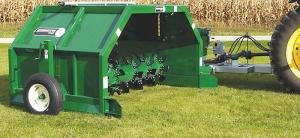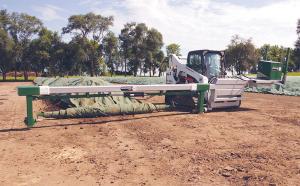Compost Business Bigger And Better Than Ever
Edwin Blosser introduced his first composting machine, the Aeromaster, 24 years ago in FARM SHOW (Vol. 20, No. 6). His company, Midwest Bio Systems (MBS), has matured and expanded in the years since with more machines and a wide array of other products. They include windrow covers and equipment to handle them, compost tea extractors, testing equipment and inoculants. The company even offers workshops on composting.
“The workshops are a good place for people considering a composting business to get started,” says Kelly Young, Midwest Bio Systems. “With our workshops and our products, we want to teach you how to make the best possible compost you can. We also offer advanced workshops, but people often come back and review the entry workshop as there is so much information covered.”
The $875, 3-day workshops combine classroom and on-site demonstrations covering everything from building a recipe and understanding feedstocks to building and monitoring the windrow. They include using products to make better compost and tips on using and marketing the end product.
“The compost talks to you through temperature and CO2 release,” explains Young. “If they’re not right, there is something wrong in your recipe or process.”
Young emphasizes that properly made compost should not smell like the feedstock, such as manure. Inoculants sold by the company cover the 3 phases of compost making: breakdown, build-up and finish.
“They help capture and stabilize nutrients, reduce odor, turn organic matter into humus and increase overall microbial population and diversity,” explains Young.
“The machines are built heavy, very sturdy and durable,” says Young. “They don’t have a lot of moving parts, and they last a long time. We hear from people with equipment they’ve used for 12 years or more.”
The pull-type composters range in size for sites producing from 5,000 to 40,000 tons of finished compost per season.
“We manufacture and sell 6 different models today,” says Young. “Over the years the big change has been drum design. The microorganisms need oxygen to break down the waste, and we’ve redone the drum tines for good aeration. We also add water as we turn the material to maintain 40 to 45 percent moisture.”
She notes that an important feature of the company’s composters is their auto-trip mechanism. Should a composter hit a chunk of concrete or other heavy object, the auto-trip prevents tearing up the pto.
“We have the ability to lift out of the windrow, remove the problem material and go back into the same spot,” says Young. “It is a handy feature simply for checking material in the middle of a pile.”
Windrow fabric covers and equipment to unroll and reroll the covers helps protect the developing compost from sun and wind, as well as excess moisture. The 2 models and fabrics match windrows made by the company’s 2 larger and 2 smaller composters.
The company’s Compost Tea Extraction Systems capture soluble and suspended minerals, humic substances, enzymes and microbes at 3 times the rate of brewed compost tea. “Unlike brewed tea systems with a shelf life of 24 to 48 hours, the extracted tea can be stored for 2 to 3 weeks before being used,” says Young.
When FARM SHOW did its first story, the relatively new company had already shipped composters to 25 states. Today the company claims customers in 48 states and 28 different countries.”
Contact: FARM SHOW Followup, Midwest Bio Systems, 28933 35-E St., Tampico, Ill. 61283 (ph 815 438-7200; toll free 800 689-0714; info@midwestbiosystems.com; www.midwestbiosystems.com).

Click here to download page story appeared in.
Click here to read entire issue
Compost Business Bigger And Better Than Ever MISCELLANEOUS EQUIPMENT Miscellaneous Edwin Blosser introduced his first composting machine the Aeromaster 24 years ago in FARM SHOW Vol 20 No 6 His company Midwest Bio Systems MBS has matured and expanded in the years since with more machines and a wide array of other products They include windrow covers and equipment to handle them compost tea extractors testing equipment and inoculants The company even offers workshops on composting “The workshops are a good place for people considering a composting business to get started ” says Kelly Young Midwest Bio Systems “With our workshops and our products we want to teach you how to make the best possible compost you can We also offer advanced workshops but people often come back and review the entry workshop as there is so much information covered ” The $875 3-day workshops combine classroom and on-site demonstrations covering everything from building a recipe and understanding feedstocks to building and monitoring the windrow They include using products to make better compost and tips on using and marketing the end product “The compost talks to you through temperature and CO2 release ” explains Young “If they’re not right there is something wrong in your recipe or process ” Young emphasizes that properly made compost should not smell like the feedstock such as manure Inoculants sold by the company cover the 3 phases of compost making: breakdown build-up and finish “They help capture and stabilize nutrients reduce odor turn organic matter into humus and increase overall microbial population and diversity ” explains Young “The machines are built heavy very sturdy and durable ” says Young “They don’t have a lot of moving parts and they last a long time We hear from people with equipment they’ve used for 12 years or more ” The pull-type composters range in size for sites producing from 5 000 to 40 000 tons of finished compost per season “We manufacture and sell 6 different models today ” says Young “Over the years the big change has been drum design The microorganisms need oxygen to break down the waste and we’ve redone the drum tines for good aeration We also add water as we turn the material to maintain 40 to 45 percent moisture ” She notes that an important feature of the company’s composters is their auto-trip mechanism Should a composter hit a chunk of concrete or other heavy object the auto-trip prevents tearing up the pto “We have the ability to lift out of the windrow remove the problem material and go back into the same spot ” says Young “It is a handy feature simply for checking material in the middle of a pile ” Windrow fabric covers and equipment to unroll and reroll the covers helps protect the developing compost from sun and wind as well as excess moisture The 2 models and fabrics match windrows made by the company’s 2 larger and 2 smaller composters The company’s Compost Tea Extraction Systems capture soluble and suspended minerals humic substances enzymes and microbes at 3 times the rate of brewed compost tea “Unlike brewed tea systems with a shelf life of 24 to 48 hours the extracted tea can be stored for 2 to 3 weeks before being used ” says Young When FARM SHOW did its first story the relatively new company had already shipped composters to 25 states Today the company claims customers in 48 states and 28 different countries ” Contact: FARM SHOW Followup Midwest Bio Systems 28933 35-E St Tampico Ill 61283 ph 815 438-7200; toll free 800 689-0714; info@midwestbiosystems com; www midwestbiosystems com
To read the rest of this story, download this issue below or click
here to register with your account number.








